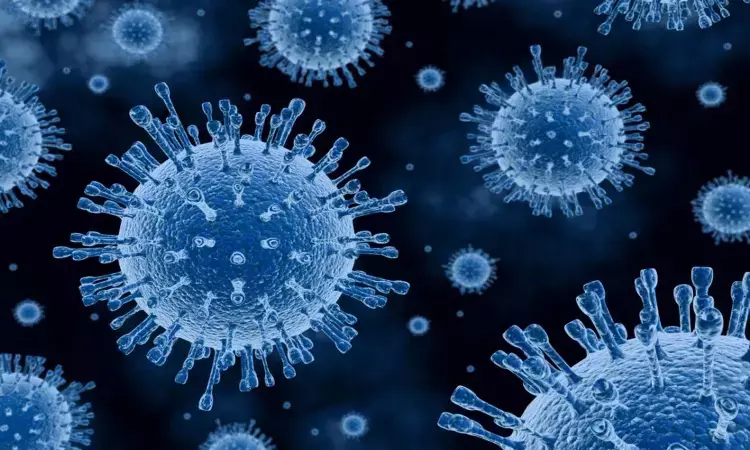- Home
- Medical news & Guidelines
- Anesthesiology
- Cardiology and CTVS
- Critical Care
- Dentistry
- Dermatology
- Diabetes and Endocrinology
- ENT
- Gastroenterology
- Medicine
- Nephrology
- Neurology
- Obstretics-Gynaecology
- Oncology
- Ophthalmology
- Orthopaedics
- Pediatrics-Neonatology
- Psychiatry
- Pulmonology
- Radiology
- Surgery
- Urology
- Laboratory Medicine
- Diet
- Nursing
- Paramedical
- Physiotherapy
- Health news
- Fact Check
- Bone Health Fact Check
- Brain Health Fact Check
- Cancer Related Fact Check
- Child Care Fact Check
- Dental and oral health fact check
- Diabetes and metabolic health fact check
- Diet and Nutrition Fact Check
- Eye and ENT Care Fact Check
- Fitness fact check
- Gut health fact check
- Heart health fact check
- Kidney health fact check
- Medical education fact check
- Men's health fact check
- Respiratory fact check
- Skin and hair care fact check
- Vaccine and Immunization fact check
- Women's health fact check
- AYUSH
- State News
- Andaman and Nicobar Islands
- Andhra Pradesh
- Arunachal Pradesh
- Assam
- Bihar
- Chandigarh
- Chattisgarh
- Dadra and Nagar Haveli
- Daman and Diu
- Delhi
- Goa
- Gujarat
- Haryana
- Himachal Pradesh
- Jammu & Kashmir
- Jharkhand
- Karnataka
- Kerala
- Ladakh
- Lakshadweep
- Madhya Pradesh
- Maharashtra
- Manipur
- Meghalaya
- Mizoram
- Nagaland
- Odisha
- Puducherry
- Punjab
- Rajasthan
- Sikkim
- Tamil Nadu
- Telangana
- Tripura
- Uttar Pradesh
- Uttrakhand
- West Bengal
- Medical Education
- Industry
First rapid guidelines on Covid 19 by NICE

National Institute for Health and Care Excellence (NICE) has published its first rapid guidelines on the care of people with suspected and confirmed COVID-19, and in patients without COVID-19.
After SARS and MERS, COVID-19 has been the third pandemic caused by a coronavirus that has led to worldwide panic.
The new guidelines essentially cover management of patients in critical care, the management of patients who are having kidney dialysis and the management of patients who are receiving systemic anticancer treatments.
COVID-19 rapid guideline for critical care patients
1.All patients on admission to hospital, irrespective of COVID-19 status, should continue to be assessed for frailty using a recognised frailty score (for example, the Clinical Frailty Scale [CFS]).
2.The risks and benefits and likely outcomes should be discussed with patients, carers or advocates and families using decision support tools (where available) so that they can make informed decisions about their treatment wherever possible.
3.In cases of confirmed COVID-19 patients, decisions about admission to critical care should be made on the basis of medical benefit, taking into account the likelihood that the person will recover to an outcome that is acceptable to them and within a period of time consistent with the diagnosis.
COVID-19 rapid guideline: delivery of systemic anticancer treatments
1.Where decisions need to be made about prioritising patients for treatment, these need to take into account the level of immunosuppression associated with individual treatments and cancer types, and any other patient-specific risk factors. They should also balance the risk from cancer not being treated optimally versus the risk of becoming seriously ill if they contract COVID-19 because of immunosuppression.
2.In patients where changes need to be made to usual care because of system pressures, the guideline says consideration should be given to delivering treatment in different and less immunosuppressive regimens, different locations or via another route of administration.
COVID-19 rapid guideline in CKD: dialysis service delivery
1.All patients with suspected COVID-19 should be assessed to see whether dialysis could be delayed until their COVID-19 status is known.
2.It has also been recommended that outpatient transport services should get patients to their dialysis as scheduled to avoid their condition deteriorating. It should also be ensured that appropriate transport services are available by finding out what current transport providers are prepared to provide, and whether there are alternative providers if the current providers will not transport patients infected with COVID-19.
NICE has said that further guidelines will be announced in due course but are likely to include: symptom management; patients receiving radiotherapy; and patients with rheumatoid arthritis. NICE will publish new guidelines each week until the full set has been completed, based on the priorities for patients and the NHS.
The guidelines are being produced in collaboration with NHS England/Improvement and a cross-specialty clinical group, supported by the specialist societies and Royal Colleges.
Dr Kamal Kant Kohli-MBBS, DTCD- a chest specialist with more than 30 years of practice and a flair for writing clinical articles, Dr Kamal Kant Kohli joined Medical Dialogues as a Chief Editor of Medical News. Besides writing articles, as an editor, he proofreads and verifies all the medical content published on Medical Dialogues including those coming from journals, studies,medical conferences,guidelines etc. Email: drkohli@medicaldialogues.in. Contact no. 011-43720751


